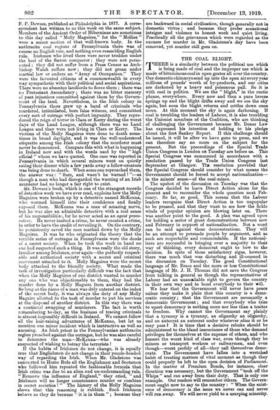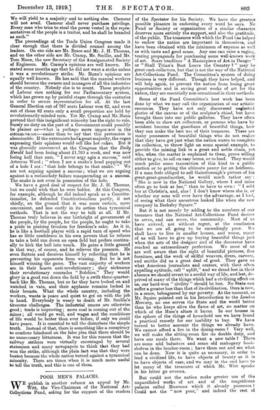THE COAL BLIGHT. T HERE is a similarity between the political
use which is being made of coal and the improper use which is made of bituminous coal in open grates all over the country. Our domestic chimneys send up into the open air every year millions of pounds' worth of by-products, and our cities are darkened by a heavy and poisonous pall. So it is with coal in politics. We see the " blight," in 'the rustic phrase, everywhere. Every now and then a pure breeze springs up and the blight drifts away and we see the sky again, but soon the blight returns and settles down once more. At this moment the sky is again darkening. If coal is troubling the leaders of Labour, it is also troubling the Unionist members of the Coalition, who are thinking of challenging the Government because Mr. Bonar Law has expressed his intention of holding to his pledge about the first Sankey Report. If this challenge should be issued, it will be after we have gone to press, and we can therefore say no more on the subject for the present. But the proceedings of the Special Trade Union Congress in London on Tuesday are before us. This Special Congress was summoned in accordance with a resolution passed by the Trade Union Congress last September at Glasgow. Thu resolution provided that the Special Congress should consider by what means the Government should be forced to accept nationalization— in the miners' sense—of the coal-mines.
The upshot of the discussion on Tuesday was that the Congress decided to leave Direct Action alone for the present and to reconsider the whole question next February. So far, so good. This means that the Labour leaders recognize that Direct Action is too unpopular to be pressed, and that they want to see how the fickle winds of popular opinion are blowing later on. There was another point to the good. A plan was agreed upon for holding a series of great demonstrations between now and February in support of nationalization. Not a word can be said against these demonstrations. They will be an attempt to persuade people by argument, and as such are respectable and commendable. If the nationalizers are successful in bringing over a majority to their way of thinking, every democrat ought to bow to the decision. In spite of these satisfactory signs, however, there was much that was disturbing and ill-omened in the discussion on Tuesday. The good Constitutional language of Mr. Brace and the more or less Constitutional language of Mr. J. H. Thomas did not save the Congress from talking in general as though the representatives of Labour had an unassailable right to govern the country in their own way and to bend everybody to their will. We fear that the Government will never have peace unless they make it plain that this country is a democratic country ; that the Government are necessarily a democratic Government ; and that everybody who tries to upset democracy is nothing more nor less than a traitor to freedom. Why cannot the Government say plainly that a tyranny is a tyranny, an oligarchy an oligarchy, and an autocrat an autocrat under whatever alias it or he may pass / It is time that a decisive rebuke should be administered to the bland insouciance of those who demand privileges for themselves at the expense of others, and who foment the worst kind of class war, even though they be miners or transport workers or railwaymen, and even though—worst perfidy of all—they call themselves democrats. The Government have fallen into a wretched habit of treating matters of vital moment as though they could properly be left to the open decision of Parliament. In the matter of Premium Bonds, for instance, clear direction was necessary, but the Government " took off the Whips " and ran away from their duty. That is only one example. Our readers will remember others. The Government ought now to say to the country : " When the existence of democracy is the issue we never can and never will runaway. We will never yield to a usurping minority. We will yield to a majority and to nothing else. Clamour will not avail. Clamour shall never purchase privilege. Every man who tries to steal the power vested in the representatives of the people is a traitor, and he shall be branded as such."
The proceedings of the Trade Union Congress made it clear enough that there is divided counsel among the leaders. On one side are Mr. Brace and Mr. J. H. Thomas, and on the other side are Mr. Cramp, Mr. Smillie, and Mr. Tom Mann, the new Secretary of the Amalgamated Society of Engineers. Mr. Cramp's opinions are well known. He stated some months ago that he did not want a strike unless it was a revolutionary strike. Mr. Mann's opinions are equally well known. He has said that the manual workers should. become the owners and managers of all the industries of the country. Nobody else is to count. These prophets of Labour care nothing for our Parliamentary system, which has grown up by painful stages through the centuries in order to secure representation for all. At the last General Election out of 707 seats Labour won 62, and even out .of those 62 seats only a small proportion are held by revolutionarily minded men. Yet Mr. Cramp and Mr. Mann pretend that this insignificant minority has the right to rule. Surely no duty on the part of a Government could possibly be plainer or—what is perhaps more important in the circum3tances—easier than to say that this pretension is abominable. If the extremists had a great majority, the organ expressing their opinions would sell like hot cakes. But it was gloomily announced at the Congress that the Daily Herald had been losing about 11,703 a week, and was now losing half that Bain. " I never argy agin a success," said Artemus Ward ; " when I see a snake's head popping out of a hole I sez : ' that hole belongs to that snake.' " We are not arguing against a success ; what we are arguing against is a melancholy failure masquerading as a success. The snake is not even in possession of the hole. We have a good deal of respect for Mr. J. H. Thomas, but we could wish that he were bolder. At this Congress, for example, although he did indeed speak as a Constitutionalist, he defended Constitutionalism partly, if not chiefly, on the ground that it was more certain, more convenient, and less costly in its action than tyrannical methods. That is not the way to talk at all. If Mr. Thomas truly believes in our birthright of government of the people, by the people, for the people, he ought to take a pride in praising freedom for freedom's sake. As it is, he is like a football player with a rapid turn of speed who has so little confidence in his own powers that he refuses to take a bold run down an open field but prefers continually to kick the ball into touch. He gains a little ground in that way, of course, and he relieves the pressure. He even flatters and deceives himself by reflecting that he is preventing his opponents from winning But he is not himself winning the game. The vast majority of workers are in their hearts anti-revolutionary ; they nickname their revolutionary comrades " Bolshies." They would glory in a good run down the field by a swift three-quarterback like Mr. Thomas, but so far they have looked on and watched in vain, and their applause remains locked in their breasts. What the whole country, including the workers, wants is peace and quiet to get on with the job in hand.. Everybody is weary to death of Mr. Smillie's tiresome challenges. The industrial omens are otherwise good ; trade is improving ; more coal is coming out of the mines ; all would go well, and wages and the conditions of life would be better than ever before, if only we could have peace. It is essential to tell the disturbers the simple truth. Instead of that, there is something like a conspiracy to condone falsehood on the false plea that there should be no unnecessary bitterness. It was for this reason that the railway strikers were virtually encouraged by several statesmen and many newspapers to think that they had won the strike, although the plain fact was that they were beaten because the whole nation turned against a tyrannical minority. There are times when it is much more useful to tell the truth, and this is one of them.



















































 Previous page
Previous page